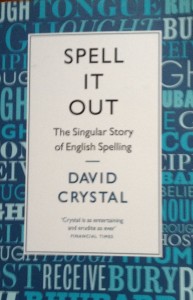One of my Christmas presents this year was a splendid book about the history of English spelling. Browsing through it I found a chapter on the differences between the way we say and spell things over here and the way it’s done in the USA. The book is about spelling, rather than usage. So while I don’t think I’ll ever be happy about ‘different than’ as opposed to ‘different to’ or ‘different from’, this wonderful book does throw light on why we write ‘humour’ and they write ‘humor’. Why the American’s plow their fields, while our ‘ploughman homeward plods ….’
The book is stuffed with fascinating and little known facts. Did you know that, initially, the American way of spelling many common words was a deliberate, political act? I had thought it had just happened, that the different spelling had just evolved. Not so. It’s all Webster’s fault. Yes, that Webster, the one of the dictionary. The one in the Johnny Mercer song.
Noah Webster, he of the dictionary, was a schoolteacher in Connecticut in the late eighteenth century. He wasn’t too happy with the teaching materials of the time; he didn’t feel they reflected the ethos of what he called the ‘new nation’. So he did something about it. In 1783, the year the American War of Independence ended, he published a textbook called The American Spelling Book. The date of publication was, therefore, significant and tied in with his views on the ‘new nation’.
Here comes the political bit. Six years after he’d produced his spelling book, Webster published a dissertation promoting an American standard of English. Asserting that it was a matter of honour ‘as an independent nation … to have a system of our own, in language as well as government.’ He went on to advocate that spelling reform play a major role in this aspiration. He saw the difference between English spelling and American as ‘an object of vast political consequence.’
It didn’t all happen at once. And thankfully some of it never happened at all. At one time Webster preferred nebor to neighbour, hiz for his, ruf for rough and even bed to bead, a change that might have led to all manner of hilarious mix-ups and misunderstandings. As to the changes that did take place, there was, inevitably, a fierce reaction over on our side of the pond. One Henry Alford, Dean of Canterbury, fulminated “at the process of deterioration which our Queen’s English has undergone at the hands of the Americans.” He wasn’t the only one. And there are plenty more Henry Alford’s around today.
There’s so much in this book – material for a plethora of blog posts. I’ll certainly return to it in the future. In the meantime I do urge everyone to go out and buy Spell it Out’. It’s a treasure trove of fascination. David Crystal writes with humour and clarity. He makes what many might think of as a dry, esoteric subject totally accessible. Some feat. It’s well researched and erudite, certainly: it’s also a very good read. It’s a ‘dip into’ book – though I warn you, once you’ve dipped you may find yourself indulging in a long and pleasurable wallow.
(Don’t forget to go to his website and discover many more lexicographic delights)

